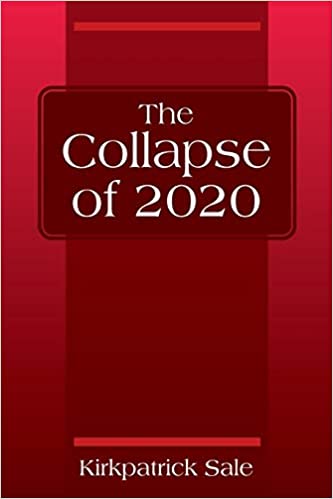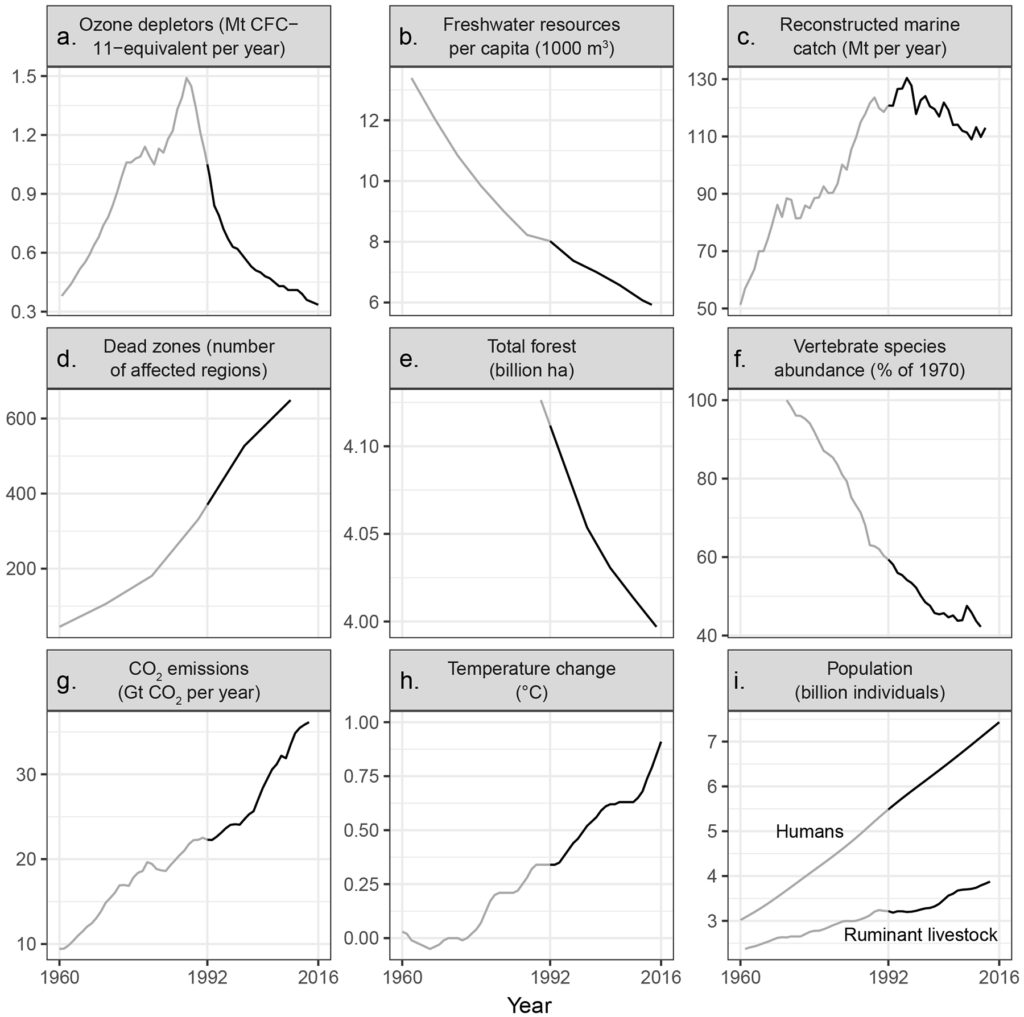Category: Predictions
Collapse!
The criticism was that the predictions failed. This is true. But the claim that there is a limit to growth with finite resources seems to me to be a truism, as does Paul Ehrich’s “The Population Bomb” (1968). Again, the criticism of these books was not that there is a population problem, but a disagreement about the severity of it, and what will take care of this problem.
We are now living in the midst of an ecological crisis, as well as with other possible global collapses. This impending sense of collapse has been analyzed and proclaimed by a host of people. One of them is Jared Diamond in his book “Collapse” (2005). Below is his 2003 TED talk on this subject:
Recently, I came across the compelling documentary film “Prophets of Doom” (2011):
It includes the following six “prophets”:
Chris Hedges, The Myth of Progress and the Collapse of Complex Societies
Kirkpatrick Sale, The Collapse of 2020, 2020.

As we race to perdition . . .
Socialism or Primitivism?
I agree, but how are we to get there?
The governments and economy are in the hands of capitalistic corporate oligarchs who are not interested in moving towards this or any other utopia.
The other consideration is that a great portion of the world is presently living off subsistence farming, and the incessant wars and impending ecological collapse may force us to devolve to a primitive subsistence mode of survival, and the best advice is to prepare for an eventual collapse (as, for example, in the Middle East, parts of Africa, etc.), and to learn basic survival skills:
World Scientists’ Warning to Humanity: A Second Notice

Chris Hedges, “America, the Farewell Tour”
I have watched Chris Hedges giving lectures and interviews on his recent book America, the Farewell Tour (August 2018). Watch the two below and find others to watch.
Hedges talks about many things, but the main thesis which he is advancing — in my view — is that American civilization is in decline. This is caused by the failings of corporate capitalism and the State. Hedges cites the idea of Sheldon Wolin that America lives in an “inverted totalitarianism” — the control of the State by corporations, otherwise called “fascism.” The symptoms of the decline of the American State are a bloated militarism and a rising national debt which will result in a collapse of the dollar.
One of the causes of these failings is the dis-industrialization of America causing massive unemployment and poverty, especially among Blacks. Another failure is the ecological disaster, which now is practically inevitable. The socio-psychological symptom of this decline is, what Emile Durkheim called, anomie — a disintegration of a feeling of face-to-face community, leading to a sense of loneliness and despair, resulting in many cases in suicide, affecting mostly middle-aged white males. Hedges’ response to this situation is not to hope, but to resist and rebel — even in the face of the seemingly inevitable.
It appears to me that Hedges is a social democrat who thinks things can be changed by political reform and, if necessary, by revolution. He sees that both the Democrats and the Republicans are both an appendage of corporate power. He cites various abuses by the government, especially such measures as the Patriot Act which justifies violent methods in dealing with non-violent protests, such as the Occupy Movement or the Water Protectors.
The resistance which he has in mind is to go out into the streets to participate in massive protests against government policies, as, in fact, has and is happening, and should continue to happen. He says this frightens those in power to comply.
Corporate Totalitarianism: The End Game
“Fuck Hope” — George Carlin
Below is George Carlin’s reading of the preface to his book Brain Droppings, 1997. Further below is the transcript. At the bottom, Carlin reads his whole book.
For a long time my stand up material has drawn from three sources. The first is the English language. You know, words, phrases, sayings — and the ways we speak. The second source — as with most comedians — has been what I think of as the “little world,” those things we all experience every day: driving, food, pets, relationships, and idle thoughts. The third area is, what I call, the “big world”: war, politics, race, death — the social issues.
So, without actually having measured, I would say this book reflects the balance rather closely. Now the first two areas in the book will speak for themselves. But concerning the big world, let me say a few things.
I’m happy to tell you that there’s little in this world that I believe in. Listening to the comedians who comment on political, social, and cultural issues, I notice that most of their material reflects kind of an underlying belief that somehow things were better once, and with just a little effort we could set them right again. They’re looking for solutions and rooting for particular results, and I think that limits the tone and substance of what they say. They’re talented and funny people but they’re really nothing more than cheerleaders attached to a specific wished-for outcome.
I don’t feel so confined.
I frankly don’t give a fuck how it all turns out in this country or anywhere else for that matter. I think the human game was up a long time ago when the high priests and traders took over, and now we’re just playing out the string. And that is, of course, precisely what I find so amusing! The slow circling of the drain by a once promising species and the sappy ever more desperate belief in this country that there is actually some sort of an ‘American Dream’ which has merely been misplaced.
The decay and disintegration of this culture is astonishingly amusing if you’re emotionally detached from it. And I’ve always viewed it from a safe distance, knowing I don’t belong. Doesn’t include me, it never has. No matter how you care to define it, I do not identify with the local group, planet, species, race, nation, state, religion, party, union, club, association, neighborhood-improvement committee. I have no interest in any of it.
I love and treasure individuals as I meet them, I loathe and despise the groups they identify with and belong to.
So if you hear something in this book that sounds like advocacy of a particular political point of view, please reject the notion. My interest in issues is merely to point out how badly we’re doing, not to suggest a way we might do better.
Don’t confuse me with those who cling to hope. I enjoy describing how things are, I have no interest in how they ought to be. And I certainly have no interest in fixing them. I sincerely believe that if you think there’s a solution, you’re part of the problem.
My motto: Fuck Hope.
P.S. In case you’re wondering, personally I’m a joyful individual, I had a long happy marriage and a close and loving family, my career has turned out better than I ever dreamed, and it continues to expand. I’m a personal optimist, but a skeptic about all else. What may sound to some like anger, is really nothing more than sympathetic contempt. I view my species with a combination of wonder and pity, and I root for its destruction. And please don’t confuse my point of view with cynicism–the real cynics are the ones who tell you everything’s gonna be all right.
And P.P.S., by the way, if by some chance you folks do manage to straighten things out and make everything better, I still don’t wish to be included.
Requiem for the American Dream (Noam Chomsky)
The End of the American Empire?


On the Ralph Nader Radio Hour, titled “The Falling of the American Empire,” Ralph talks to Chris Hedges, who has just written a new book: America: The Farewell Tour, 2018.
